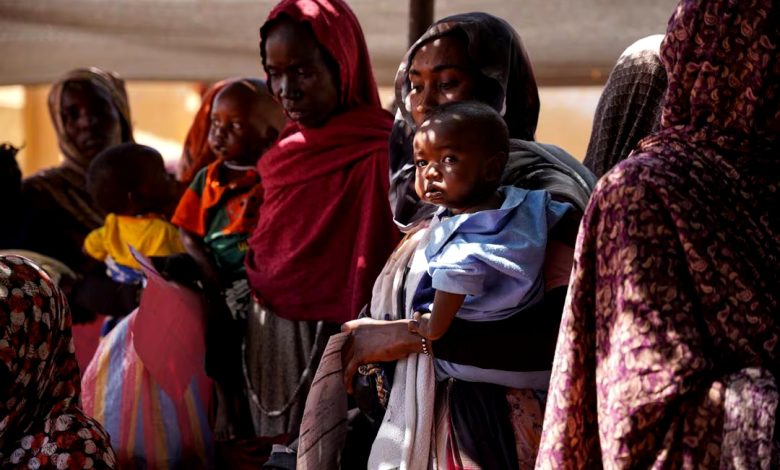Millions of Sudanese Go Hungry due to War

Written by Nafisa Al-Taher
A mother skips meals until there is enough food for her two children. A 60-year-old man eats one meal a day – a piece of dough made from flour and water. People venture out of their homes in desperate search for food, risking being hit by artillery shells.
Dozens of similar accounts collected by Reuters show the number of people suffering from hunger in areas of Sudan most affected by the war that broke out last April, including areas in the capital, Khartoum, and in the western Darfur region. The number of Sudanese facing emergency levels of hunger – the pre-famine stage – has more than tripled in one year to nearly five million, according to the Integrated Food Security Phase Classification, the globally recognized food security index.
In Sudan’s capital, hundreds of thousands of people face a daily struggle to find food, as the communal kitchens they rely on are threatened by dwindling supplies and a communications outage across much of the country in recent weeks. In Darfur, some areas have not received any aid since the Sudanese army and the Rapid Support Forces, a paramilitary force, entered the war almost a year ago.
Aid agencies, which say they have been unable to deliver food to many areas of the war-torn country, warn that hunger is expected to worsen as Sudan’s summer season approaches in April and July – the time of year when food supply is low because farmers plant.
“We are in grave danger of an epic, biblical-style famine in Sudan,” Jan Egeland, head of the Norwegian Refugee Council, said in an interview after visiting camps in Chad in mid-February where more than half a million Sudanese refugees now reside.
Reuters spoke to 30 residents, many of them in war-torn areas of Sudan where hunger has set in since the fighting began. Most of them spoke on the phone or via Whatsapp. Some of them were interviewed in Cairo, where they had taken refuge after fleeing their homes. Reuters also interviewed more than 20 aid workers.
The Sudanese army and the Rapid Support Forces did not respond to questions related to this story.
Drink untreated water
Al-Fatihab, an area in the city of Omdurman across the River Nile State from Khartoum, is on the front line in the battle between the army and the Rapid Support Forces. Residents searching for food say they have had to contend with RSF checkpoints, as well as artillery and sniper fire from the RSF and the army.
People are afraid to leave their homes for fear of harassment and beatings. Mahmoud Mohammad, 60 years old, said that he was robbed and flogged by RSF fighters when he tried to go to the market last December. “When I returned home, my jalabiya was covered in blood,” he said, referring to the traditional robe he was wearing. A family member confirmed that Mohammad was covered in blood when he arrived home.
Mohammad’s wife then started going out in search of food, but stopped after she heard that the Rapid Support Forces had detained a group of women and that others had disappeared. Two other residents said they had also heard about women disappearing early this year. Reuters was unable to independently confirm these reports of disappearances. Last month, Mohammad and his family fled Al-Fatihab.
Residents said that electricity and water facilities were damaged during the fighting, depriving them of electricity and running water. Many suffered from diarrhea after being forced to drink untreated water from the Nile. The World Health Organization has reported more than 10,000 suspected cases of cholera across the country since the outbreak of war.
In an effort to feed thousands of Al-Fitaihab residents, volunteers set up soup kitchens early in the war that served porridge, rice and bread once or twice a day. But Mohieddin Jaafar, a volunteer, told Reuters that collective kitchens were forced to reduce these meals when the Rapid Support Forces’ siege of the area cut off supplies last July.
The volunteers are part of so-called “emergency response rooms” – a network that works to feed and evacuate residents in areas across the country. Three volunteers were killed by artillery shells and stray bullets in Al-Fitaihab last year while trying to help fellow residents, according to two volunteers.
In late February, the Sudanese army made progress in the area, breaking the siege on part of Al-Fitaihab. This allowed the food to start flowing.
The army and RSF together staged a coup against dictator Omar Al-Bashir in 2019, but went to war when tensions rose over a planned transition to civilian rule and elections. The Rapid Support Forces quickly controlled most of Khartoum, despite the army’s superiority in air power and heavy weapons. Paramilitary forces have also tightened their grip on Darfur, which has been torn apart by more than two decades of conflict and displacement.
The current war has sparked waves of ethnic killing in Darfur. Reuters recorded the violence there, which was led by the Rapid Support Forces and allied militias. In a series of reports, the news agency revealed how the war unleashed a deadly, racially charged campaign against the Masalit people of West Darfur.
The RSF evolved from the militias used to crush the rebellion that broke out in Darfur in the early 2000s. By 2008, an estimated 300,000 people had died in violence, many of them from hunger.



